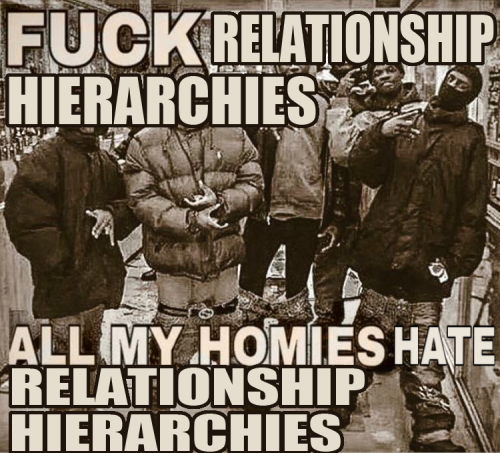#relationship anarchy
chnt:
chnt:
honestly the boundaries between friendship and romance don’t really matter that much like at all if everyone involved is ok with it
like most of what is and isn’t romance is cultural/constructed anyways… you can take and leave what you want with it as long as you maintain boundaries. does that make sense
first batch of relationship anarchy cupid hearts!! because i’ve latched onto the RA theme and wont let go, i suppose
↳ check the notes for the redbubble link
↳ feel free to request any other flags you’d like!
—
flags used, from left to right:
aro / arospec / alloaro
ace / acespec / alloace
aroace / aplatonic / polyamorous
Post link
I just wanted to talk about relationship anarchy for a minute? Okay context–
I recently met someone who I think is cool and nice to talk to. I’ve met them while they were at a very low point, and I just decided to help them a bit because I could (I knew I could, because I’ve known I’m aro for a while now, and part of their issues was a recent realization that they’re aro).
I didn’t do “a lot”, just my usual emotional support to soothe them and, when they were okay enough, I did push them a bit so they could rest (which they knew they needed a lot but couldn’t achieve because reasons). We spent the following day together, and got joined by some other people we know. It was a very nice day, just doing non-stressful things, and offering support when sometimes, the problems came back. It was honestly pretty enjoyable for me too, when usually spending a whole day outside will leave me with absolutely no spoon before it even ends, this day I had just enough to get back home safely. And my initial goal was making this person feel better, not particularly having a good day for myself!
And yet, it was good. Sure, I think I could become friends with this person, and would love it if it happened. But, even if it doesn’t, it won’t change the fact that this day spent together was enjoyable.
I’m so used to doing things for others (and I’m sure a lot of you relate) and worrying about being tossed aside after I’ve helped them, that I’ve now realized it’s been difficult for me to just enjoy things. Because I was always helping people to the point where I was just a recovery tool, I stressed a lot over being efficient and, even more, not being disliked. Because I had invested a lot into these people. But it wasn’t the case here. I hadn’t invested anything, I had just stumbled upon a stressful situation: we had just met the day before!
I didn’t give advice, didn’t even try to, because it wasn’t what they were asking for and, because we didn’t know each other, they couldn’t realistically ask for that: I don’t know anything about their life. And I think this lack of expectation - from both sides - made the enjoyment we had possible.
(Because of the context we met in, we also knew we had the same political values, and were “safe” which definitely helps a lot to have a positive experience. The time spent together was not superficial or anything thanks to that trust. Thought it was worth mentioning)
We’re not close, we’re not even friends. Just two people who met by chance and had a moment. And I think it’s important to value such relationships too. It’s freeing. And yes, maybe sometimes, close relationships can begin that way, which is totally cool! But this kind of experience doesn’t have to lead to a friendship or any kind of more defined relationship.
I’m not saying I want my life filled with only fleeting moments, because that would be tiring (I’m a spoonie, please don’t ask me too much) but…I’ve realized that I very much desire to have those kinds of passing relationships in my life. They may not be the only thing needed to fulfill what I want out of life, but those kinds of moments are still extremely valuable, and I hope my life will have more of those.
This weekend has been full of awesome conversations, connections, interactions, and people.
Relationship Anarchy Basics by Marie S. Crosswell
A relationship anarchist believes that love is abundant and infinite, that all forms of love are equal, that relationships can and should develop organically with no adherence to rules or expectations from outside sources, that two people in any kind of emotionally salient relationship should have the freedom to do whatever they naturally desire both inside their relationship and outside of it with other people.
Relationship anarchy does share with polyamory an overall rejection of sexual and romantic monogamy, its common rejection of legal/institutional marriage, etc, but it also seeks to completely break down what I like to call the Romantic Sex-Based Relationship Hierarchy by erasing relationship categories determined by the presence or absence of sex and/or romance. Relationship anarchy consequently creates equality of all personal/intimate relationships, behaviorally and emotionally. The freedom to interact and value one’s relationships starting with a blank slate, distributing physical intimacy, sexual intimacy, emotional intimacy, etc. according to one’s desires rather than preexisting rules and categories of relationship types, is an expression of this equality.
Relationship anarchists do not rank personal, loving relationships. They do not see any set of behaviors as innately restricted to romantic and/or sexual relationships, which certainly makes it difficult to elevate romantic-sexual relationships to a superior position above nonsexual/nonromantic relationships. RA’s see all of their personal, loving relationships—meaning, any relationship that isn’t professional or casual in nature—as equally important, unique, fulfilling different needs or desires in their life, and as possessing similar or identical potential for emotional/physical/mental intimacy, love, and satisfaction. A relationship anarchist does not place an emotional ceiling on nonromantic/nonsexual friendship or on a sexual friendship that’s devoid of “romance.” A relationship anarchist does not limit physical/sensual affection in their nonsexual relationships just because they’re nonsexual or nonromantic. A relationship anarchist does not expect to spend most of their time with just one sexual partner/romantic partner or with their romantic/sexual partners in general, nor does an RA assume that the romantic/sexual relationships (if they have any) automatically deserve or get more time and prioritization than the nonsexual/nonromantic relationships.
I really like relationship anarchy because it recognizes the “Romantic Sex-Based Relationship Hierarchy”, or, how mainstream society promotes putting labels on relationships and ranking them according to if you’re getting some or not, or if you’re “serious” or not (which is often construed as romance). I don’t interpret relationship anarchy as having no hierarchies at all – some relationships will be prioritized because of time constraints, and there will always be differences in how much someone cares about different people – but it’s accepting that there is no value hierarchy in loving relationships (platonic, romantic, sexual, or otherwise).
I think that placing romantic, sexual relationships on a pedestal is dangerous. Esther Perel, in her talk Rethinking Infidelity, remarks, “We have a romantic ideal in which we turn to one person to fulfill an endless list of needs: to be my greatest lover, my best friend, the best parent, my trusted confidant, my emotional companion, my intellectual equal. And I am it: I’m chosen, I’m unique, I’m indispensable, I’m irreplaceable, I’m the one.” To depend on one individual so much, to be depended upon in the same way, to have your sense of self so intertwined – that’s terrifying to me.
I was talking with a friend about this and he noted that a lot of people desire comfort and stability, especially in relationships, and the standard monogamous relationship structure provides them that. It’s a way to make sure that the other person still loves you without having to check every time, and, in a sense, it avoids dealing with relationships as living things (that is, the supposedly terrifying notion that people and feelings change). Something we discussed is how odd it is that romantic relationships are defined by their end – a breakup or divorce automatically classifies the relationship as a failure. It goes back to viewing the end of a comfortable thing as an indication that it was never stable to begin with, along with the sunk cost fallacy. It doesn’t recognize the value of a relationship as the relationship itself.
There’s also a big difference between people who desire children and a family and people who don’t. I find that this correlates with the desire for comfort and stability (which makes sense in the context of raising a child), but also with the desire to be “normal” (or conform to societal norms because they don’t want to be “weird” or be viewed as an outsider).
Another note: RA is important to me as someone who’s asexual. Marie writes, “Relationship anarchy should be important to the asexual community because it is the only method of relationships that removes sex as an indicator of relationship value, of a partner’s value, and as the line of separation between important, serious bonds and less important, casual bonds.” There’s a documentary about asexuality, (A)sexual, that’s currently on Netflix. Part of it follows David Jay, the founder of AVEN (the Asexual Visibility and Education Network, which is the largest online asexual community), as he navigates through his relationships as an asexual person. What devastated me more than I expected was his conclusion when some of his close relationships ended because his partners directed more time toward their own sexual partners:
You know, when I think about intimacy, I still think mostly about communities, but I’ve also been shifting a lot and thinking more and more about intimacy with one person. So, that’s a transition from where I was a couple of years ago. And I think that the biggest thing that created that was what happened in my relationships. […] Feeling those relationships drift apart was really scary for me, and it sort of made me feel like maybe, even if I could make community relationships that were as close as I could possibly make them, they still wouldn’t be relationships that I could depend on in the way that I wanted to. They wouldn’t be relationships that I could raise a kid in. And that was really disheartening for me for a while. And thinking about that, I sort of…that made me more interested in a relationship with one person as a way to be kind of more stable. Even, like, that person could be a sexual person, and I could even be in a relationship that involved sex. I know that that’s something a lot of asexual people do, and that’s not something that I’m opposed to, but I know that I would need kind of that community-building or something else to really be the core source of intimacy in our relationship.
So, I want to clarify a little bit why sex is something that I’d want to have in a relationship with someone. The reason that sex is something that I’m now kind of willing to have in my relationships with people really gets to the fact that sex is how we take relationships seriously and that I feel like I’m gonna have a much easier time having a relationship that gets taken seriously and a relationship that works – envelops more options – if that’s something that I’m willing to put on the table.
I’ve spent so much time in this community fighting for the idea that people don’t need sex to be happy that it is really kind of disheartening for me to feel like I might need to have sex, just because that’s the only way to, like, access the kind of intimacy that I want to access. It feels like I’m not able to really form a connection on my own terms in the way that I would like to, and that’s fine. No one forms intimacy totally on their own terms. But that makes it…yeah, that was a little hard for me to get over.
What upset me the most was the admittance that most people believe that sex is key to intimacy, and in order for asexual people to enter into deeply intimate relationships, we may need to work within the romantic sex-based relationship hierarchical system. It may come down to compromises in the end, which are present in all types of relationships; it’s just that dealing with asexuality and aromanticism exposes the compromises that many allosexual/alloromantic people avoid or believe are “dealbreakers” in sexual/romantic relationships.
5 Ways Powerful People Trick You Into Hating Protesters by David Wong
Let’s say that tomorrow you are elected Secret Ruler of the USA, a position that gives you total power over the government, economy, and the culture at large – everything that hippies refer to as “the system.” Now, your first job is to not get beheaded by rioting peasants, which means your first job is really to maintain “stability” (i.e., “keeping things mostly the way they are”).
Wait For One Of Them To Break The Law, Then Talk Only About That
- “I mean, why can’t they protest within the law? You know, like Martin Luther King? That’s why he was universally respected in his day!”
Convince The Powerful Majority That They’re The Oppressed Ones
- Three simple steps – exaggerate the victim’s power to get the public on your side, get the victim to lash out so you can claim victimhood yourself, insist all of their complaints are disingenuous.
Focus On Their Most Frivolous Complaints (And Most Unlikable Members)
- […] notice how we’re always making it personal – as demonstrated above, you don’t talk about global warming, you talk about Al Gore. You don’t talk about systemic racism, you talk about Al Sharpton’s unpaid taxes. Don’t talk about income inequality, talk about how Occupy Wall Street kids all have iPhones.
Pit Two Disadvantaged Groups Against One Another (And Insist That Only One Can “Win”)
- If you can just convince them it’s a competition, they’ll spend all their energy hating each other and none of it trying to fix the system. The guy in the trailer park doesn’t blame the bankers for the economy, he blames minorities and immigrants. Only one of us can be the true victim here, dammit!
Insist That Any Change Will Ruin The World
- Remember, humans are naturally risk-averse – people will stay in bad jobs and relationships and keep destructive habits, for fear that trying to fix the bad shit will result in losing everything. […] all you have to do is portray any criticism of the current system as an attack on everything we hold dear…
Overlooking the clickbait title and overly sarcastic tone, David thoughtfully lists out different techniques that the majority uses to control how the public views dissenting minority voices.
Just learned about the concept of relationship anarchyand WOW that has just given me much to consider. Have any of y'all heard of it before?
I’m super curious to know how the aro/ace communities think about it since in a lot of ways it seems to align really well with how a lot of us think about relationships in general.
Ok I’m intrigued…please tell me more!
Ask and you shall receive
Relationship Anarchy sorta explained
Youasked, so I shall do my best to explain. Let’s keep in mind that I quite literally learned about the existence of relationship anarchy a day ago so take all of this with a massivegrain of salt lol but here we go:
Western society has lots of rules of how each relationship is supposed to look/operate.
Friends aren’t supposed to raise kids together, merge finances, etc. That’s only for married couples.
People who are romantically intertwined are supposed to kiss, have sex, etc. and eventually end up married.
The ideal romantic partner is someone who can fulfill most if not all of your emotional, physical, and sexual needs, and anything less is a sign of incompatibility.
There’s also the relationship hierarchy that society upholds—or the “relationship escalator.”
At the bottom is friends, then romantic partners, then spouse.
The more intimate you become with a friend, the more likely people are to assume you want to be romantic with them—i.e they assume you’re moving up the escalator.
The more intimate you become with a romantic partner, the more likely you are to get questions about when you’re going to “take the next step” and get married.
Lots of rules, lots of expectations. And relationship anarchy (RA) basically says “no ”
RA basically refers to a deliberate rejection of these social norms. No rules and no inherent hierarchy.
Instead, partners decide amongst themselves what they want their relationships to look like.
Here’s a nifty graph to help visualize this:

You can be friends who rely on each other as primary sources of emotional and sexual fulfillment. Life partners, but you don’t have sex or romance at all.
You can be sexually, romantically, emotionally fulfilled by one person but still just be two people loving and experiencing each other with no need for labels or the expectation of any “escalator” progression towards marriage or anything else.
Essentially, you build relationships buffet style, and each relationship is as significant in your life as you want it to be and they all serve whatever role you want them to serve. These relationships can be monogamous or polyamorous or anything in between.
Totally up to you.
Just learned about the concept of relationship anarchyand WOW that has just given me much to consider. Have any of y'all heard of it before?
I’m super curious to know how the aro/ace communities think about it since in a lot of ways it seems to align really well with how a lot of us think about relationships in general.
We at TAAAP envision all orientations and relationship structures equally esteemed, which requires intentional community building not centred around romantic-sexual couple units!
[ID: In all caps, “Fuck relationship hierarchies, All my homies hate relationship hierarchies.” End ID.]
Post link
What to do When Your Partner is on a Date?
This is a pretty standard beginner question you see come up in polyam and non-monogamy groups.
First, I have personally been working on reframing my thoughts around my partners being with others. Think about it. You rarely hear people ask “What do you do when your partner is at work?”, “What do you do when your partner is at the gym?”, etc. The reality is that we don’t spend EVERY WAKING MOMENT with our partners. They are off doing things all the time that don’t include us. This is no different. If you stop elevating date time/romantic interaction time that your partner has with others above any other time that they spend doing something apart from you, it takes some of the edge off. So now my answer to that question is the same thing I do any other time that I’m not with him. Whatever I want.
Here are some actual tips that have helped me in the past (and in the present) when my partner was out with someone else, especially as I am someone who is prone to jealousy and envy:
1. Feel your feelings. It’s ok to feel jealous or envious. It’s not the end of the world. And the quicker you just allow yourself to feel what you’re feeling, the faster it moves on. I say to myself things like “My partner is on a date and I’m feeling jealous. What’s for dinner?” It’s not a big deal and it doesn’t make you “bad” at polyamory. It just makes you human.
2. I read this thing once called a “date sandwich” where you and your partner are intentional about spending quality time together loving and affirming each other before and after your partner goes on the date. It really helps.
3. Do things you LIKE to do. If you use your partners date time to balance the checkbook or do the laundry or some other adulty thing, you’re going to associate the time your partner spends with other people with drudgery (unless you enjoy doing all of those things in which case rock on!). I like to do things I like to do that my partner doesn’t particularly enjoy that way my brain begins to associate my partner being away with others as pleasure for me, too. Watch that show your partner can’t stand, eat that stinky cheese they gag over when they see you eating it, go see that weird movie your partner would be miserable sitting through. Reconnect with your ability to bring pleasure to yourself all by yourself.
4. Set up a support system if you need it. Schedule time with your own partners if that’s available. Set up a phone call with a polyam friend who’ll understand. Video chat with a person who’s important to you that may be far away. Use that time to reconnect with the other important people in your life.
5. Don’t blow up your partner’s phone while they are on a date. That’s inconsiderate to the person they are on a date with and them. If there’s an emergency, of course reach out but if it can wait, wait. If you are struggling through some feelings and need to share that, write it down and share it with them when they return. Try to give them the space to enjoy themselves.










